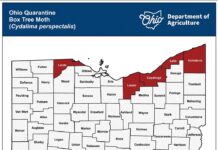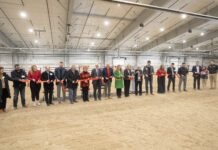UNIVERSITY PARK, Pa. — The grass sometimes looks greener on the other side of the fence — or in the other corner of the state — not necessarily because it actually is greener, but because a disturbance in one’s own backyard makes the local situation lose its luster.
That’s the case with some property owners in southwestern Pennsylvania as they compare their situations to landowners in the northeastern counties as the shale-gas boom continues to reverberate around the commonwealth, according to Gary Sheppard, Penn State Cooperative Extension educator from Westmoreland County.
“I see some real differences that stand out,” he said. “The popular press seems focused on the northeast corner, while the southwest is just as big and just as productive, with active gas leases going back to the early 1900s.”
Sheppard noted that while the core Marcellus acreage is in the northeast, the number of gas wells and amount of drilling activity is about the same as in the southwest.
Webinar
Sheppard will be the featured speaker during a free Web-based seminar titled Perspectives on Marcellus Shale Gas Development in Southwest Pennsylvania, which will air April 29 at 1 p.m.
Sponsored by Penn State Cooperative Extension, the “webinar” will provide an overview of some of the differences between the two leading gas-exploration regions in Pennsylvania.
Information about how to register for the webinar is available at http://naturalgas.extension.psu.edu/Events.htm. Online participants will have the opportunity to ask questions during the session.
“We need to present an unbiased perspective,” Sheppard said. “There are impacts and things that are happening to our communities that are not all on the good side. There is some discord, and some people are making out better than others on their leases.”
Upset
He said that some of these discrepancies contribute to bad feelings or “moods” among people in his region.
Sheppard identifies disparities in lease rates as a social irritant, noting that the pre-Marcellus leases were “based upon a different world” when people weren’t able to negotiate lease agreements. Many leases were signed in the early 1900s when southwestern Pennsylvania was a glass- and steel-producing region, and companies like PPG and Westmoreland Glass settled there because of the natural gas in the area.
“We’ve been leasing for more than 100 years, long before Marcellus,” Sheppard said. “The only active wells in the northeast are Marcellus wells, and they’ve had the opportunity to negotiate with a clean slate.
“The average royalty from one major gas company in southwest Pennsylvania is reported to be 12.9 percent, and that creates some discord. People are hearing of others getting 20 percent when they’re only getting 12 percent, and they somehow feel cheated.”
Reasons
Regional attitudes also may vary because the impact may seem less apparent in less-populated areas. There are 50 people per square mile in the northeastern part of the state, while there are 200 people per square mile in the southwest, Sheppard explained.
“Where you have more houses, you have more concerns about pipelines, and you need better coordination,” he said. “Every well needs a road, even with a traditional shallow well, which is fairly invisible, but that road is still there.
“There is also concern about the deterioration of public roads that are shared routes leading to people’s homes. Locally, many people are greatly concerned about the footprint. It’s just staggering what’s going on,”
Sheppard said, adding that he wants people to consider what their community is going to look like as development continues. “We’re a hilly region. When you put in a 5-acre pad and clear around it, create an upslope and downslope — and in the vicinity of farming — you’ve created some issues.”
Concerns
Placing a drilling pad on a hillside among farming contour strips can pose problems for planting, tillage and runoff in farm operations, according to Sheppard. And with 336 wells drilled in the southwest counties last year, he said this may represent more than 960 acres of new pads and roads in the region.
“The land disturbance is such that we shouldn’t be ignoring it. We should be thinking about it as more of a community-development conversation and really thinking through this strategically,” he said. “Minimizing the number of wells out there would minimize the right-of-ways for pipelines.”
Development concerns are prevalent statewide and are no less acute in his region, Sheppard said. According to industry trade group Marcellus Shale Coalition, there were 763 Marcellus wells drilled in 2009.
At the end of last year, 326 wells had been drilled in the northeast counties, 10 fewer than the 336 wells in the southwestern counties, according to Sheppard. The Marcellus Shale Coalition estimates that the number of new wells drilled will double to about 1,750 in 2010. The Philadelphia Inquirer recently reported that gas-exploration companies have tripled last year’s pace and have broken ground on three new Marcellus shale wells statewide every day this year.
Disaster
Water-quality issues are another shared concern statewide, but the southwest may be more wary since the contamination of Dunkard Creek, which left a 38-mile stretch of water near the headwaters of the Monongahela River nearly dead.
More than 160 species of fish, mussels, salamanders, crayfish and aquatic insects were killed by mysterious pollutants, possibly connected to Marcellus operations, according to the state Department of Environmental Protection.
“The whole creek was killed,” Sheppard said, “and the Monongahela surpassed the allowable amount of dissolved solids. Even though we have a much more mature gas industry, some of the tools they have to manage water issues are a little more advanced in the northeast corner, at least from the water withdrawal side.
“From the social-discord and policy standpoint in Pennsylvania, we need to be aware of and thinking through some of these things,” Sheppard said. “Money and the economics are incredibly important, but we shouldn’t ignore the impact on our social relationships.”
Series
The Perspectives on Marcellus Shale Gas Development in Southwest Pennsylvania webinar is part of an ongoing series of workshops addressing issues related to the state’s Marcellus shale gas boom.
Previous webinars, which covered topics such as water use and quality, gas-leasing considerations for landowners and implications for local communities can be viewed at http://naturalgas.extension.psu.edu/webinars.htm.










